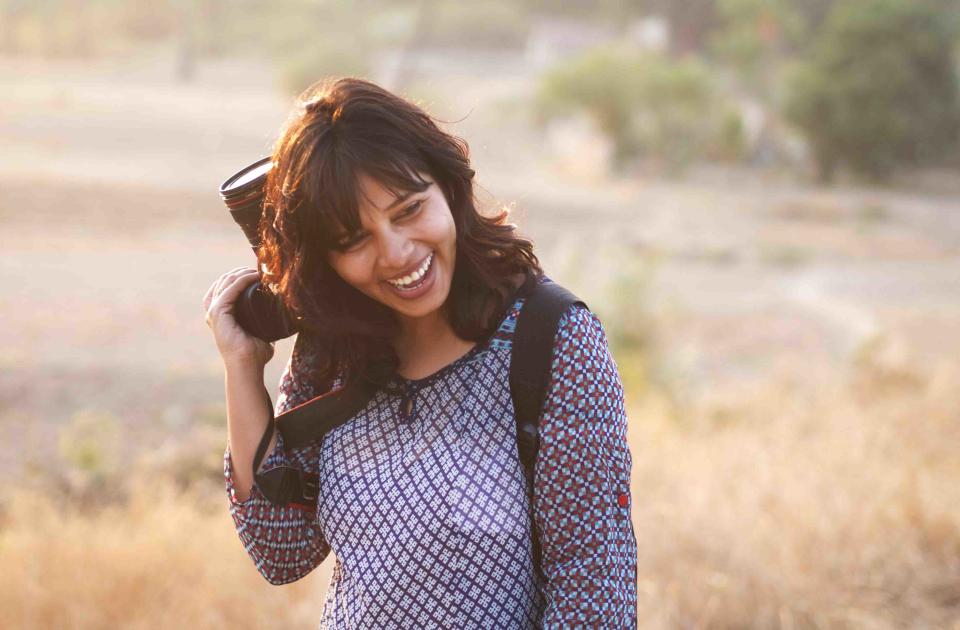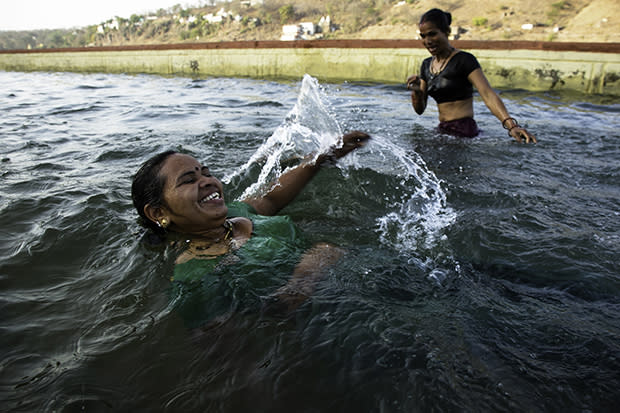Covering Women of India Through Her Camera: Deepti Asthana's Story of Leaving IT Career to Pursue Photography
In 2016, while working at an IT company, Deepti Asthana was also pursuing a project as an independent photographer, on women drug-addicts in Punjab . While she interviewed a few women for her project, a 21-year old orphan girl was her story’s main character.
“I knew that the girl was in trouble and I decided to go back later to help her, and complete the story,” she recollects.
But sometime later, Deepti was informed by a local hospital in Punjab that the girl had committed suicide. “I feel I could have done something more about it. I never got the opportunity to go back and that stayed with me for a long time,” she says.
The story about Punjab’s women drug-addicts never got published.

Deepti quit her job in 2017 to document gender issues and human rights. Her flagship project ‘Women Of India’ focuses on the plight of Maharashtra's farmer widows and Tamil Nadu’s abandoned fishing women. Deepti’s work has been published in National Geographic magazine, BBC, Al Jazeera, Der Spiegel, Daily Post, Huffington Post, The Hindu, The Quint, and Scroll among others.
Struggling her way up the ladder
Born in Lucknow, Deepti lost her father when she was three years old, following which she had to shift to her paternal grandparent’s house in Bareilly, in Uttar Pradesh, with her mother and two brothers. Her mother, who was previously ‘not allowed to work,’ was now the head of the family and took up a clerical job at a government office. Deepti’s grandparents were not keen on keeping any relationship with them, leading Deepti to feel insecure in the house. Once she was done with schooling, Deepti was glad to move out of UP.
She says, “I was not happy about how things were for girls in UP. It was even difficult to go to school; someone would always chase me back home. Most of my friends were also starting to get married. I had two options - to either study hard, or find a way to settle down. I was keen on building my own career. My dream was to be independent,” she says.
With hard work, Deepti got herself enrolled for a course in BioInformatics in SASTRA University (deemed to be), in Tamil Nadu.
Meeting students from the big cities and metros, Deepti often felt left out and below average. Although she struggled with speaking in English, she grew confident over time. Post college, Deepti joined Tata Consultancy Services.
Juggling between two jobs
“While studying, I felt that things would be fine after I get a job. But I never really felt that I was contributing enough,” Deepti tells MAKERS India.
In 2012, she went to London for an off-site project with TCS. It was her first trip abroad. Her perspective on personal freedom changed when she met women who were strong enough to do what they wanted to do and wear whatever they wished to.
While still in London, Deepti was introduced to a digital camera for the first time, by a colleague. After going on a photography trip to the countryside, Deepti bought her own digital camera - a Canon 550D.
When she returned to India in 2013, Deepti left TCS and shifted to Mumbai, where she worked with First Data Corporation. “Mumbai offered a different kind of freedom. It was safe for women and I started travelling on my own,” she says.
Since her job let her work remotely too, Deepti started travelling with photography groups. Her first solo trip was to Agumbe, in Karnataka, where she travelled with a group of wildlife photographers. Her first international photography trip was to Cambodia, in the same year. She started a travel blog soon, and has since been invited by the tourism departments of Jordan, Thailand and Taiwan.
Finding her calling
In 2016, Al Jazeera published Deepti’s article about farmer widows in Maharashtra. “Once my work started getting published, it gave me the validation to continue with photography,” she says. Soon, Deepti travelled to Gujarat to cover the lives of salt pan workers. There, she met a 13-year-old girl who was a child labourer, who had to lift heavy pans of salt over her head to dump on the tractor.
“This was wrong and disheartening. It was at this moment that I realised that I had to do more stories about women. India was a huge country and there are so many stories to be told and issues to be solved. We keep debating about women empowerment and feminism, but things are still very backward in most of rural India,” Deepti says.
She quit her job in 2017 to start her documentary and journalism journey.

Stories about women
Deepti has travelled across Tamil Nadu, Gujarat, Uttarakhand and Rajasthan to cover the stories of women. Last year she won the Alexandra Bolut Grant by VII Photo agency and completed her diploma in photojournalism from Danish School of Media and Journalism, Denmark. Her work has been exhibited in Switzerland, Scotland, and the USA.
While travel continues to be a passion, Deepti is more inclined towards covering stories about women as she relates to them personally. Looking back, Deepti feels that she has lived two lives and she is now in a better position to help women stuck at the less fortunate side.
Life as a ‘woman’ photographer
With millions of photographs flooding the internet every day, Deepti feels it is very important to find a story that connects with people. Her inspiration is American photojournalist Stephanie Sinclair, whose work also focuses on gender and human rights issues. “If she can travel all the way to India to cover these issues, why would I - being an Indian, having all the access and understanding the language- not do the same?” Deepti says.
While Deepti has faced awkward reactions from people for travelling alone, sometimes strangers have been welcoming to her too. But she feels that women have to learn a way to be safe – like avoiding being out at night.
Deepti refuses to reveal her age, as she has observed that people make assumptions based on it. But Deepti’s work is anything but amateur. Recently, Deepti was in Rajasthan’s Thar desert for about 20 days, covering two women forest guards. Both of these women are post graduates, and one of them is a 25-year old widow with a child. “Despite all the odds, these women continue to do their jobs and that inspires me,” Deepti says.


